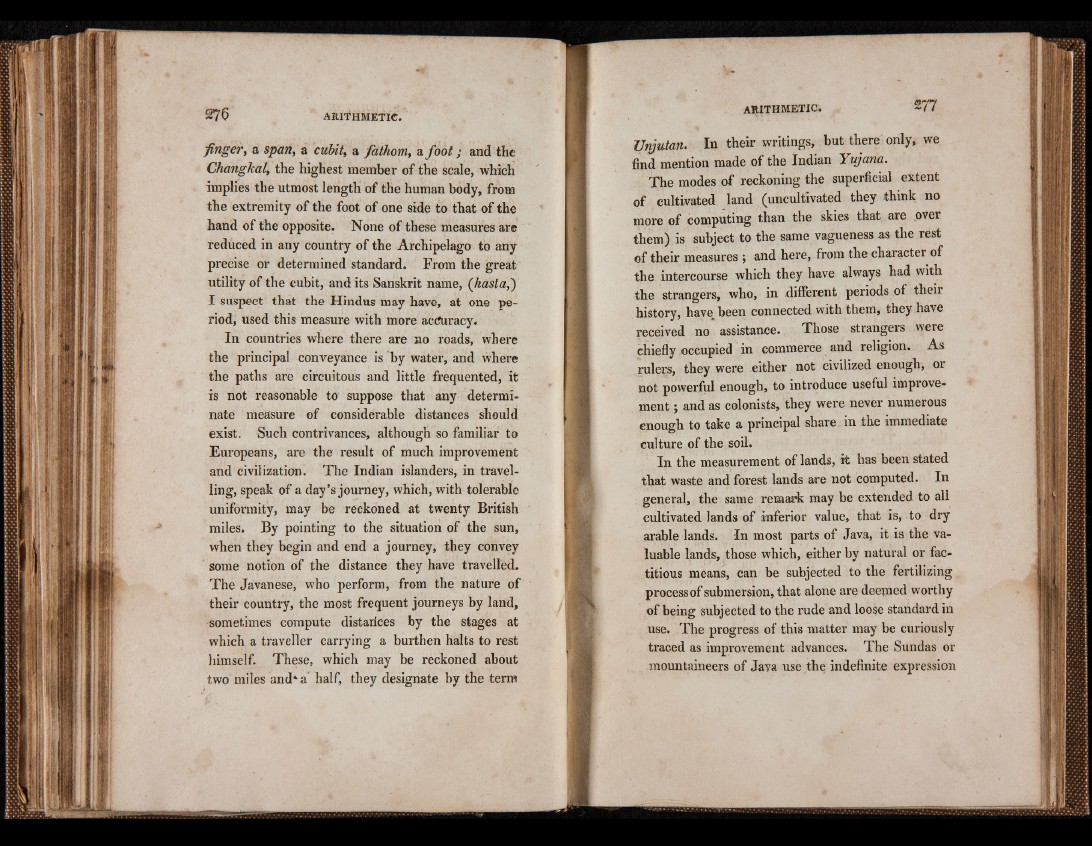
finger, a span, & cubit, a fathom,, a fo o t; and the
Changkal, the highest member of the scale, which
implies the utmost length of the human body, from
the extremity of the foot of one side to that of the
hand of the opposite. None of these measures are
reduced in any country of the Archipelago to any
precise or determined standard. From the great
utility of the cubit, and its Sanskrit name, (hasia,)
I suspect that the Hindus may have, at one period,
used this measure with more accuracy.
In countries where there are no roads, where
the principal conveyance is by water, and where
the paths are circuitous and little frequented, it
is not reasonable to suppose that any determinate
measure of considerable distances should
exist. Such contrivances, although so familiar to
Europeans, are the result of much improvement
and civilization. The Indian islanders, in travelling,
speak of a day’s journey, which, with tolerable
uniformity, may be reckoned at twenty British
miles. By pointing to the situation of the sun,
when they begin and end a journey, they convey
some notion of the distance they have travelled.
The Javanese, who perform, from the nature of
their country, the most frequent journeys by land,
sometimes compute distarfces by the stages at
which a traveller carrying a burthen halts to rest
himself. These, which may be reckoned about
two miles and* a half, they designate by the term
Unjutan. In their writings, but there only, we
find mention made of the Indian Yujana.
The modes of reckoning the superficial extent
of cultivated land (uncultivated they think no
more of computing than the skies that are over
them) is subject to the same vaguenesses the rest
of their measures ; and here, from the character of
the intercourse which they have always had with
the strangers, who, in .different periods of their
history, have been connected with them, they have
received no assistance. Those strangers were
chiefly occupied in commerce and religion. As
rulers, they were either not civilized enough, or
not powerful enough, to introduce useful improvement
; and as colonists, they were never numerous
enough to take a principal share., in the immediate
culture of the soil.
In the measurement of lands, it has been stated
that waste and forest lands are not computed. In
general, the same remark may be extended to all
cultivated lands qf inferior value, that is, to dry
arable lands. -In most parts of Java, it is the valuable
lands, those which, either by natural or factitious
means, can be subjected to the fertilizing
process of submersion, that alone are deemed worthy
of being subjected to the rude and loose standard in
use. The progress of this matter may be curiously
traced as improvement advances. The Sundas or
mountaineers of Jaya use the indefinite expression